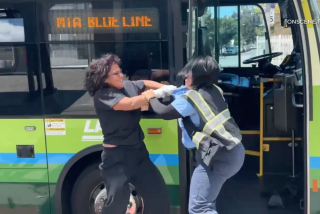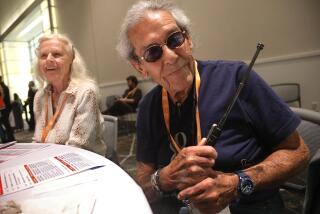To N.Y. Cabbies, Life Isn’t Fare
- Share via
NEW YORK — To hear them gripe and grouse and kvetch, you’d think New York City cabdrivers were the Rodney Dangerfields of the working world.
They get no respect! Officious cops, road-hogging motorists, insouciant jaywalkers, fault-finding women, impatient men, nitpicky inspectors from the Taxi and Limousine Commission--all give righteous, hard-working, long-suffering cabbies a hard time. Even other cabbies give cabbies a hard time.
Or so it was said one recent Friday night at a mandatory customer relations class for probationary cabdrivers at LaGuardia Community College. The official emphasis is on helping deaf, blind, wheelchair-using and other disabled customers, but otherwise this four-hour class focused mostly on ... attitude.
Some cabbies call it “charm school.” It began in 1997, a legacy of the Americans With Disabilities Act, and, through 2001, 46,026 cabbies had paid $20 tuition each to take it. All must complete the course as part of their 12-month probationary period.
On this Friday night in a standard-issue, fluorescent-lit college classroom, instructor Jeffrey Walsh, a former New York cabbie himself, stands against a bright orange wall. A fold-up wheelchair and a chalkboard are his only props. Eighteen glum-looking students, all male, align their desks in a semicircle.
In friendly tones, Walsh asks each cabbie his name, where he’s from--more than half are from Pakistan--and what he likes about the job. Flexible hours, they say, and money in the pocket, adventure, meeting people, being their own boss. Negatives? Traffic, rude passengers, drunk passengers, no union, no benefits, too-low rates, poorly maintained cars, lack of respect.
Customers, one cabbie grumbles, climb into his cab and instantly set the wrong tone. They don’t talk “nice.” “They say things to put me down.” And women! He says he never receives decent tips from women. He also says women complain about him, without cause, to the Taxi and Limousine Commission.
Walsh replies, “If you start thinking that all customers do this, you might be creating a situation where you make them do it. You’re thinking, ‘Hey, it’s me against them.’”
In a pan-ethnic, hyper-stressed, time-is-money city like New York, problem fares are bound to crop up. But a taxi driver, unlike a bartender, has it easy: Even factoring in airport runs, “you have a customer an average of six minutes.”
Walsh says, “Six minutes! That’s all you have to deal with this guy. Gentlemen, who cares what they say. You be pleasant. The guy grousing in the back of the cab, you think he saves that just for you? No! He does it to everybody.” So don’t take it personally, he says.
Walsh stresses safety and the fact that drivers must keep their tempers in check. Otherwise, he says, “you may be setting yourself up for something ugly.” He tells drivers to never, ever, argue with cops. He advises civility in speech.
Walsh asks the students to define the public image of the New York cabbie. Rude, someone says. Leans on the horn. Reckless. And where does this perception come from? The students laugh and admit: cabdrivers.
In an annual survey by etiquette expert Marjabelle Young Stewart, New York tied improbably with Charleston, S.C., last year as the nation’s most polite city. Yet in customer relations class, rudimentary, Golden Rule-type lessons in getting along must be reinforced.
Walsh tells the true story of a cabbie who goes to the flower district every Valentine’s Day to buy roses and then presents a rose to every woman fare. Tips? He cleans up. A second cabbie gained about $40 a day in extra tips by offering customers a stick of chewing gum.
After class, several cabbies, kvetchers to the end, resume their Dangerfieldesque, cabbies-get-no-respect beefs against the taxi commission and others in authority.
Says one: “I feel like I’m in boot camp. I’ve got all these people over my head. They don’t want you to make money. They want to see you suffer.”
*
Mary Voboril is a reporter for Newsday, a Tribune company.
More to Read
Sign up for Essential California
The most important California stories and recommendations in your inbox every morning.
You may occasionally receive promotional content from the Los Angeles Times.













